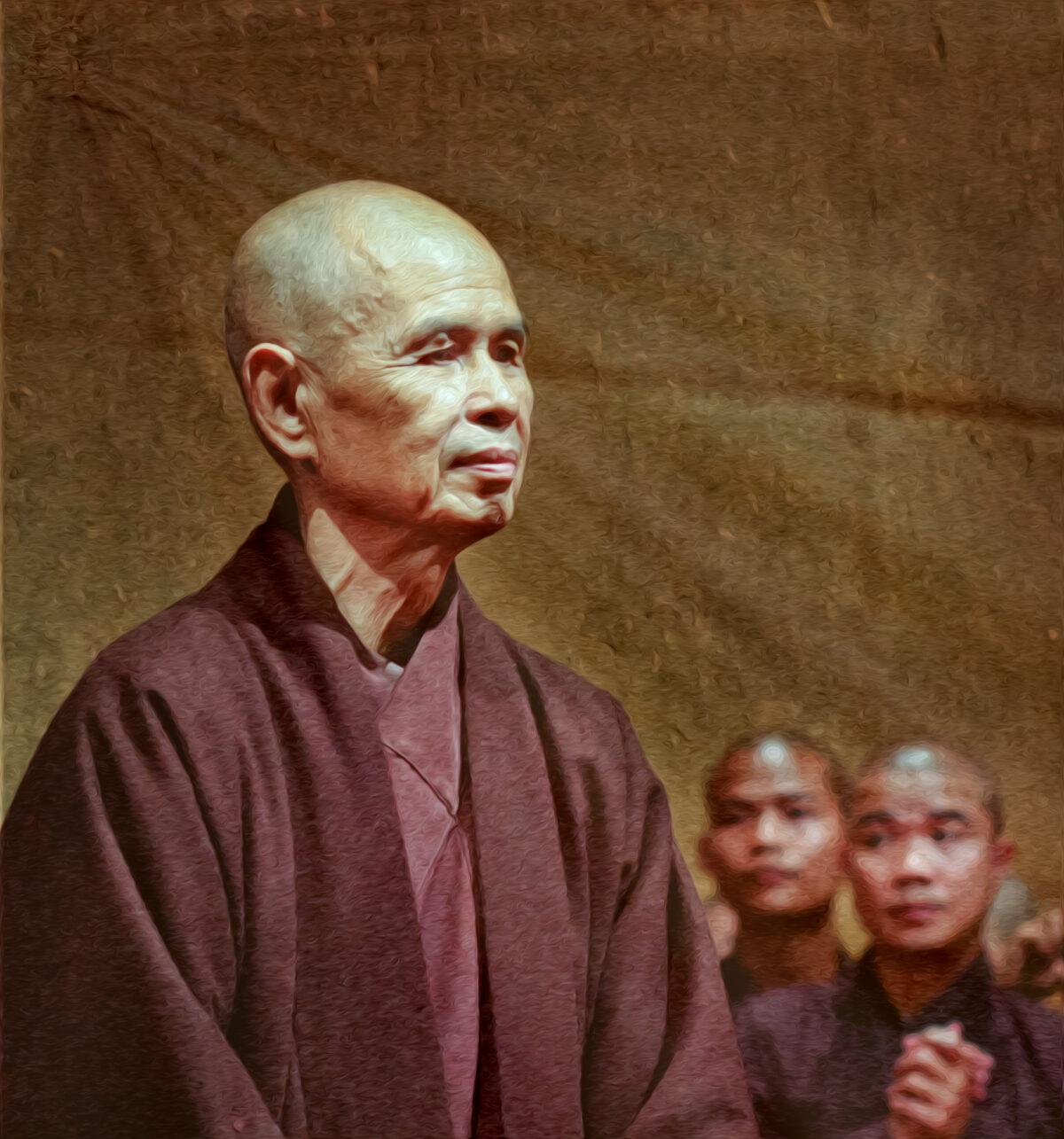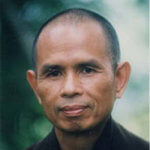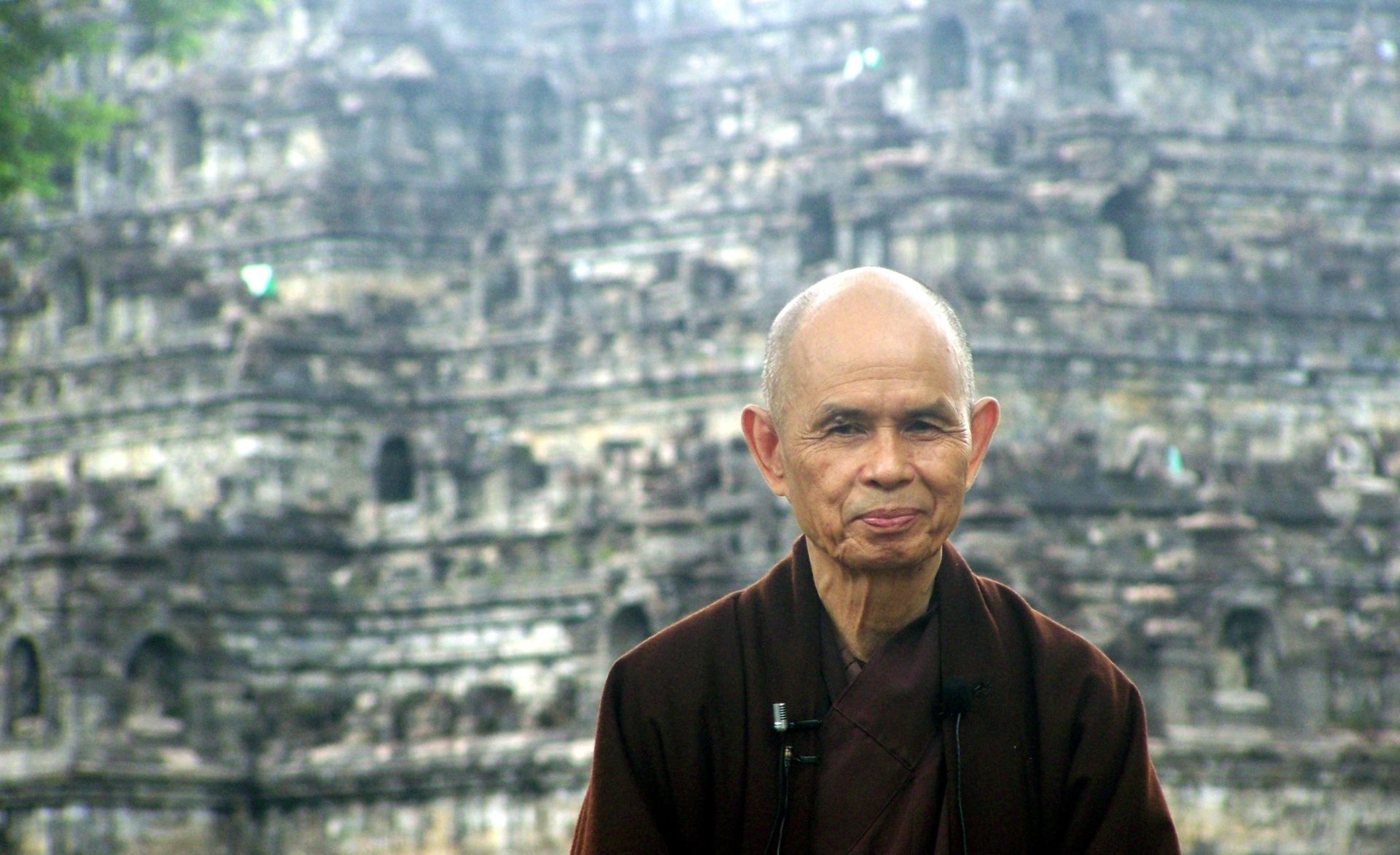The Moon Is Always the Moon
By Thich Nhat Hanh on
Listen Śāriputra, all phenomena bear the mark of Emptiness; their true nature is the nature of ... no Increasing, no Decreasing.
Many of us consider growing up as a kind of increasing, and getting old as a kind of decreasing. When we say that humans go from ashes to ashes and from dust to dust,
The Moon Is Always the Moon
By Thich Nhat Hanh on
Listen Śāriputra, all phenomena bear the mark of Emptiness; their true nature is the nature of ... no Increasing, no Decreasing.
Many of us consider growing up as a kind of increasing, and getting old as a kind of decreasing. When we say that humans go from ashes to ashes and from dust to dust, it doesn’t sound very joyful, because none of us wants to return to dust. It is our mind of discrimination that thinks this way, because we don’t know what dust really is. Every atom is a vast mystery. We still have not yet fully understood electrons and nuclei; for scientists, a speck of dust is very exciting. A particle of dust is a marvel.
In the Vietnamese literary canon, there are two lines of poetry by the twelfth-century Zen master Khánh Hỷ of the Ly dynasty that say:
If the cosmos exists, then the smallest speck of dust exists. If the smallest speck of dust doesn’t exist, then the whole cosmos doesn’t exist.
The notions of existence and nonexistence are created by our minds.
The poet also says: “The entire cosmos can be put on the tip of a hair,” and “The sun and the moon can be seen in a mustard seed.”
One contains everything, and everything is one.
. . . . .
We have the tendency to think that we are much more than a grain of dust; that we are greater and the dust is lesser. But looking deeply we see that a grain of dust is just as wonderful as a human being, and that the grain of dust contains the human being, just as the human being contains the grain of dust. We do not have to die in order to return to dust, we are the dust in this very moment. When you see the no-increasing, no-decreasing nature of reality, you will have no more fear, no more complexes.
There is an old proverb that says:
Be humble; you are made of dust. Be noble; you are made of stars.
But the stars are also made of dust, and dust is made of ancient stars. There is the nature of interbeing between dust and stars. So nobility and humility must also have the nature of interbeing. Looking at the one, you can recognize the other.
We have become so arrogant that we not only think we understand what a speck of dust is, but we even pretend that we understand what a human being is—that same human being who will return to dust. When we have lived with someone for twenty or thirty years, we have the impression that we know everything about that person. While we drive the car with them sitting right next to us, we think about other things. We aren’t interested in him or her anymore. The person sitting there beside us is a real mystery! That person sitting there is a wonder of the cosmos, a child born of distant stars.
If we look with the eyes of Avalokiteśvara, we will see that even one hair of that person is the entire cosmos; one eyelash can be a door opening to the ultimate reality. One speck of dust can hold the Kingdom of God, the Pure Land. You, the speck of dust, and all things inter-are. We should be more humble. There is a Chinese proverb that says: “To say you don’t know is the beginning of true knowledge.”

No Discrimination
Many human cultures cultivate wheat and rice. Since we need to eat two or three times a day, we grow a lot of grains and vegetables. We need them, so we recognize them as necessary and good to have. But we don’t value the other seeds and plants. We want to grow rice; we don’t want to grow weeds or poison oak. But that doesn’t mean that weeds and poison oak are bad or unnecessary. From the point of view of Mother Earth, poison oak and weeds are as wonderful as chrysanthemum or rosemary. It is our mind consciousness that discriminates and declares, “I want this and I do not want that. I want happiness. I want things to be clean. I like this and I don’t like that.” Mother Earth does not have these ideas. The true nature of reality for her is neither defiled nor pure, neither increasing nor decreasing.
The true nature of everything is free from concepts such as good and evil; it is indeterminate. There is no discrimination.* As living beings, we have our needs, desires, and cravings, and we have our discrimination. So we see things in terms of good and evil, increasing and decreasing, defiled and immaculate.
Mother Earth does not discriminate. If you throw perfume or flowers on her, she’s not proud. If you throw urine or excrement on her, she’s not offended. For her, everything is perfect. She knows that without this, the other cannot be. Without the mud, the lotus cannot be. So we can learn a lot from Mother Earth.
The End of Civilization
Letting go of our notions about increasing and decreasing can be helpful as we think about caring for the environment. We have polluted our water, earth, and air. We have destroyed forests and wildernesses, the oceans are rising, and thousands of species are becoming extinct. This gives rise to anxiety and despair. We are concerned that the toxic elements are increasing and the healthy elements are decreasing. That is our mind of discrimination.
From the perspective of nature, and of the universe, there is no worry and anxiety because the nature of everything is no-increasing, no-decreasing. Throughout the Earth’s history, civilizations have been destroyed because they did know how to live in harmony with each other and with nature. Our current civilization is on the same course of self-destruction. If we continue to live in such a way, producing and consuming at current levels, there is no doubt that our civilization will be destroyed. It may take a few million years, but the Earth will recover, heal, and reestablish balance. She may bring forth another civilization. For Mother Earth, nothing is increasing nor decreasing. She sees time and space at a different scale, and from a less human-centered perspective.
Most of us try to cover up our fear. Most of us are afraid of looking directly at our fear. The Buddha proposed that you bring the seed of fear up and look at it head on.
We are afraid of change, and we are terrified of climate change. We know that if we continue to live the way we do now, there will be catastrophes—many cities in coastal areas will be flooded, and many new diseases will manifest. We have destroyed huge tracts of forest in order to increase our production of meat. Almost eighty percent of our agricultural land is now used to raise animals for food or to grow grain to feed them—about thirty percent of the Earth’s total land mass. By destroying the forests, and by producing ever-increasing quantities of greenhouse gases, we endanger our civilization. Because of our greed, we risk destroying ourselves. Many of us are aware of this, but we’re afraid and we don’t know what to do. We feel powerless or paralyzed by our fear. Or we are in denial.
The Buddha advises us to look deeply into the nature of our fear and the danger that we face. This civilization of ours will have to end one day. It cannot escape dying, and its death will only be accelerated if we continue to live as we do, with this much greed, anger, and delusion. The life of a civilization is like the life of a human being. On the phenomenal level, there is birth and there is death. And maybe after the death of our civilization, the Earth will regenerate herself and new civilizations and species will be born, which will be our continuation. Death and birth continue each other, so from the perspective of the ultimate, there is no birth and no death, no increasing and no decreasing. Nothing can be lost.
So we have to accept the death of our civilization. There is something nice about accepting death; it’s a kind of relief. Because death is something you cannot avoid, so you have to accept it. I know a nun who lives in Hanoi, in Vietnam, who was told by the doctor that she had cancer and had just three months to live. First she was very shocked. She didn’t believe it—she protested, she got angry, and she was overcome by fear and despair. But at last, she was able to accept the reality of her own death. She wrote to me in France, to say that she wanted to come and live in Plum Village for a few months before going back to Vietnam to die. And so we invited her to come.
A few days after she arrived, the monastic sisters proposed that she go to a doctor to see what was going on in her body. She refused, saying, “No, I don’t need to see a doctor, I have accepted my own death. I came here not to see doctors, not to treat my disease, but just to live with you in the time I have left to live. All I want to do is to try and live every moment deeply, with Thầy and with the monks and nuns in Plum Village.” So she didn’t go to see the doctor. She tried to practice mindfulness in every moment, in every activity, throughout the whole day. As it happened, because she was able to live in that way, and because she accepted her own death, she was truly at peace. After almost three months, her visa was about to expire, so the sisters urged her once more to go and see the doctor, just for fun. This time she accepted. The doctor examined her thoroughly, and declared, “Well, we can’t believe it, but the cancer has receded and you’re quite strong now.” She went back to Hanoi and lived for another fifteen years.
There are many stories like that. They show us that when we can accept the truth, we have peace. And when we are at peace, we can heal. If we can accept the truth that by continuing to live like this, our civilization will be destroyed and many hundreds of millions will die—if we truly accept that, we will have peace. Otherwise the despair, the anger, and the fear may cause us to panic and thus bring about the end of our civilization more quickly, before the worst effects of climate change even take force.
What Is to Be Done?
We have to accept reality as it is. Once we are freed from the fear and the terror of our civilization being destroyed, we will know exactly what to do. We will be able to come together and apply the solutions available to us in order to save our planet. According to the United Nations report released on November 29, 2006, just reducing our consumption of meat by fifty percent could already be enough to save our civilization, and that is something we can all easily do.
Our fear has the potential to destroy us. But if we are able to look from the point of view of Mother Earth, with the insight of no-increasing and no-decreasing, we have a chance to transcend our fear and wake up. By seeing from the cosmic perspective, from the perspective of the Heart Sutra, and by fully accepting that our civilization can be destroyed, we may yet have a chance to save it.
According to the Buddha, you have to save yourself first, and then you will be able to save the planet. It’s like in the airplane, we have to put on our own oxygen mask first, before helping someone else. Once we have overcome our fear, we can help others to do the same. Practicing mindfulness and helping the whole human race to wake up is the only hope we have to save our civilization. If we can truly understand the insight that brings us to the other shore, we will be able to help bring about a collective awakening. If collectively we are liberated from our fear, we will know exactly how to live in order for us, for our children, and for our civilization to have a future.
We fear our own death because we think that after we die we will not be a human being anymore; we will go back to being a speck of dust. We think we will be somehow diminished. And we fear the death of our civilization because we think that after it is destroyed, it will also be just ashes and dust; it will be less than it was before, and much that was sacred, good, and beautiful will have been lost.
But that is not true. A speck of dust contains the whole universe. If we were as big as the sun, we might look down on the Earth and see it as insignificant. As human beings, we look at dust in the same way. But ideas of big and small are just concepts in our mind. Everything contains everything else; that is the principle of interbeing and interpenetration. This sheet of paper contains the sunshine, the logger, the forest, everything, so the idea that a sheet of paper is small or insignificant is just an idea. We cannot destroy even one sheet of paper. We are incapable of destroying anything. The people who assassinated Mahatma Gandhi and Martin Luther King Jr., hoped to reduce them to nothingness. Yet they continue to be with us, perhaps even more than before, because they continue in other forms. We, ourselves, continue their being. So let us not be afraid of being destroyed, individually or as a civilization. Let us not be afraid of diminishing. It is like the moon. We see the moon waxing and waning, but it is always the moon.
* The Sanskrit term for the indeterminate true nature is avyakta.
This is an excerpt from The Other Shore: A New Translation of the Heart Sutra with Commentaries by Thích Nhất Hạnh, published by Parallax Press.


